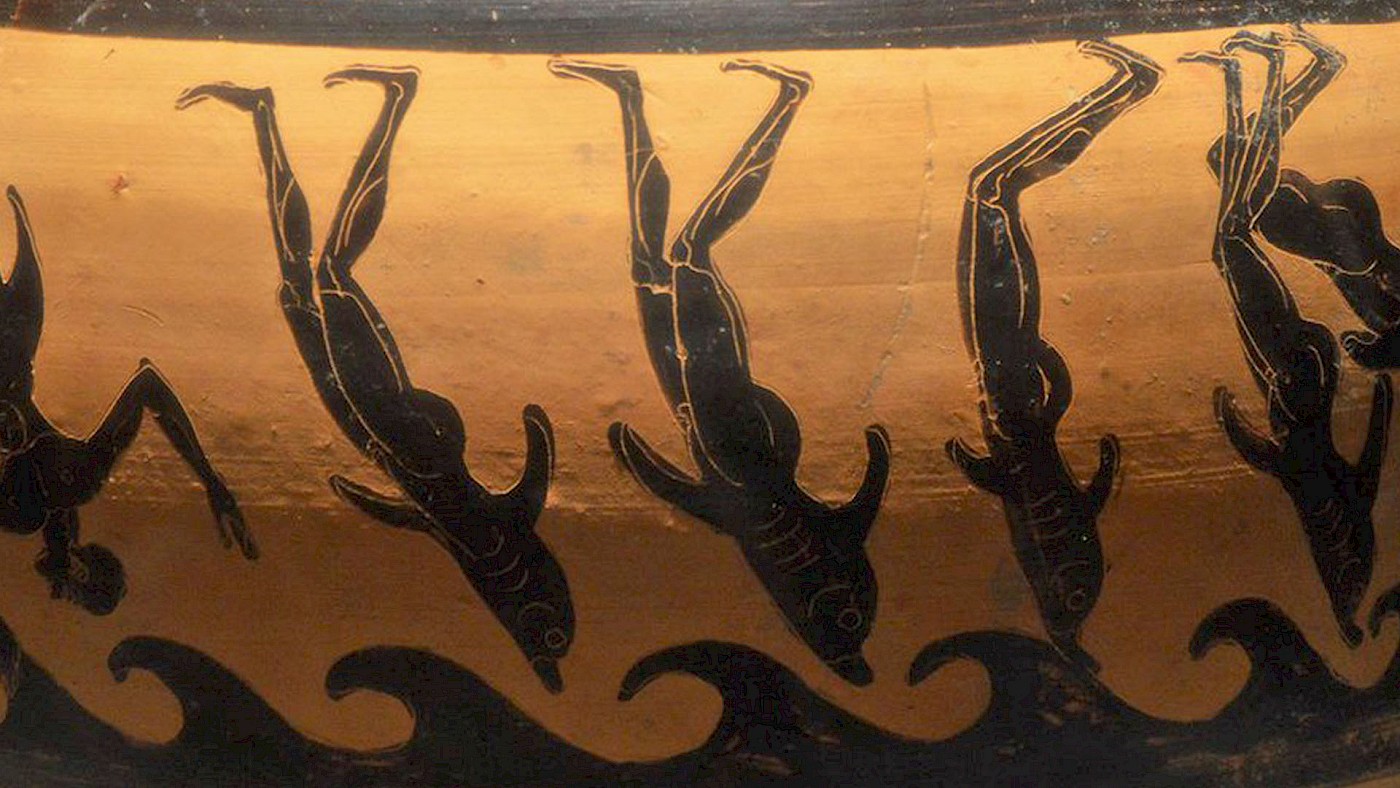The most notorious pirates in the period of Greek overseas expansion (ca. 800 to 500 BC) were the Etruscans. They were supposedly so tenacious that their presence deterred emigrants from settling around the Tyrrhenian Sea (Strabo 6.2.2; cf. Diod. Sic. 5.9.4). Their piratical reputation was cemented in the Homeric Hymn to Dionysus, probably written in the sixth century BC. The hymn tells the story of a doomed Etruscan crew who took the god prisoner.
Unlike the slaves they were used to poaching from the waves, he had the power to turn them into dolphins and escape. It was a popular tale in figured art, such as the famous kylix painted by Exekias (sixth century BC). By this point, the story was even known in Etruria, as demonstrated by a sixth-century kalpis-type hydria painted in the Etruscan black figure style (a detail is used as this article’s featured image).
By the fifth century BC, the situation had gotten so bad that Anaxilaos, tyrant of Rhegion, had to build coastal fortifications to protect his territory against Etruscan raiders (Strabo 6.1.5). Similarly, defensive measures had been implemented by the inhabitants of Lipari, a Hellenic community, against these corsairs (Strabo 6.2.10). This evidence has been considered convincing enough that many modern authors have described the Etruscans as pirates, like Strabo’s broad-strokes declaration (5.2.2).
Re-evaluating the evidence
Recently, the notion that Etruscans were pirates has been questioned. Nigel Spivey and Simon Stoddart doubted this reputation, saying that it “looks like romance” (N. Spivey and S. Stoddart, Etruscan Italy: An Archaeological History (1990)). And this is very much the impression that one gets from reading the ancient sources from an objective point of view. Looking through the Greek bias, we find another peoples who are liable to be the scourge of the Tyrrhenian Sea.
Inconveniently for authors like Strabo, though, the common culprits of sea-borne plundering that we read about were the Greeks themselves. As I’ve written about before here at Ancient World Magazine, one of the few pirates we know by name was Dionysius of Phocaea. He and his crews were driven from their homeland by the Persians, and decided to set up shop as corsairs on the coasts near Italy.
Even before these men made their westward journey, their countrymen had settled into a piratical lifestyle on Corsica. These earlier Phocaeans caused such a problem in the sea-lanes around Italy and North Africa that Carthage and Caere – and possibly other Etruscan cities, too – sent a fleet to destroy them (Hdt. 1.163-6). Even the founders of Massalia, a Greek city on the south coast of France, were said to be pirates (Just. Epit. 43.3)!
Similarly, the city of Zankle, on Sicily, was first settled by a cadre of Hellenic freebooters (Thuc. 6.4; cf. Strabo 6.2.3 and Pseudo-Skymnos 283-286). The inhabitants of Lipari may have regularly seized ships for their own gain, as they did when Rome sent an embassy to Delphi in the wake of their capture of Veii (Livy 5.28; Diod. Sic. 14.93.3).
Ironic, but predictable
The abundance of evidence for Hellenic piracy in the central Mediterranean led Jean Macintosh Turfa to conclude that “it is ironic that the Etruscans should have been branded as pirates by historians when the best literary documentation of piracy in this period is linked to intrusive Greeks” (J.M. Turfa, “Prisoners and Plagues: The Battle over Alalia,” in Caere (2016)). It is ironic, but also rather predictable.
Our sources are exclusively Greek. The Etruscan reputation developed during a time when Hellenes were spreading across the Mediterranean like a plague, encountering new peoples and places. In this environment a notion of superiority developed, as is illustrated by stories such as that of Polyphemus in the Odyssey. Non-Greeks could be discriminated against using any excuse possible. It is easy to imagine that even a single act of Tyrrhenian piracy whose story made it back to the Aegean could have been repeated, elaborated, and confused enough to label an entire people as boating brigands.
Instances like this are why we need to approach history through rigorous methods and careful thought. It was easy for historians in the past two centuries to simply copy labels found in Classical authors and apply them without question. This is the reason why contemporary, scientific, historical analysis so often challenges established ideas, and thus is met with pushback from certain corners. It is also justification for the continued academic investment in researching the past.
